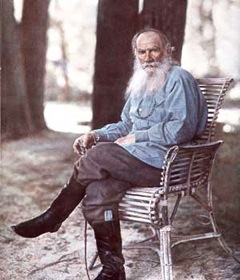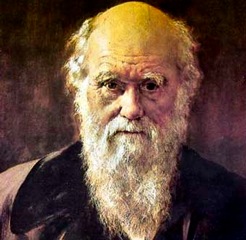February 13, 2010
There is still time to see two excellent movies: “The Last Station” and “Creation.”
“The Last Station” is about the last year of Tolstoy’s life. He fell ill at Russia’s Astopovo station and was taken to the station master’s house where he died in 1910. The film is terrifically well-acted, especially performances by Christopher Plummer and Helen Mirren.
The film will introduce many Americans to the Tolstoyan Movement inspired by Tolstoy’s writings. And many probably do not know that Tolstoy’s writings on non-violence influenced Mohandas Gandhi. Gandhi and Tolstoy exchanged a series of letters in English discussing their views on non-violence. We saw the letters on display at the Gandhi museum in Mumbai. Gandhi, as you know, was the pioneer of “Satyagraha”—the resistance of tyranny through mass civil disobedience, firmly founded upon “ahimsa,” or total non-violence. Gandhi set up a Tolstoy Farm near Johannesburg, South Africa to experiment with communal living much like Tolstoy’s country estate outside Moscow depicted in the movie.
“The Last Station” is a nice way to mark the centenary of Tolstoy’s death.

Leo Tolstoy
“Creation,” starring real-life husband and wife, Paul Bettany and Jennifer Connelly, is about Charles Darwin’s faith-versus-science struggle on whether he should publish his theory of evolution. His wife and some of his close friend’s objected to his theory of evolution for religious reasons. He actually became physically ill. The movie is based on “Annie’s Box,” a biography penned by Darwin’s great-great-grandson Randal Keynes using personal letters and diaries of the Darwin family.
To me, Charles Darwin is one of science’s superstars. Shockingly, a recent Gallup poll revealed that only 39 percent of Americans believe in evolution, even though his theory is supported by information that has been tested again and again for over 150 years. The discovery of DNA further confirmed Darwin’s theory and explains how traits are passed on. Genetics also confirms the most controversial part of Darwin’s theory: that humans and apes have a common ancestry. The ignorance of the average U.S. adult of basic scientific facts has been well documented by surveys, finding that fewer than 1 in 5 Americans met a minimal standard of scientific literacy.
Hopefully, “Creation” will enlighten more Americans about evolution and its important place in science.

Charles Darwin


 The Hunger Site
The Hunger Site
February 16, 2010 at 12:45 am
Rationality is evolution’s greatest gift to humanity.
How rarely we use it! How often, instead, we give in to group-think, ideology, and superstition.
Wise are those who challenge their own presuppositions, remembering the words of Heraclitus of Ephesus:
“I cross-examined myself.”
February 14, 2010 at 6:14 pm
Darwin and Ellsberg had that same question. Thankfully truth won out. Should I or shouldn’t I tell at great personal loss. I can relate to that.
February 13, 2010 at 2:13 pm
Charles Darwin embodied a rational approach to gaining knowledge:
Welcome examples that don’t fit into existing models of thought. Value the people who discover the nonconforming examples. Change the models of thought to make them account for the nonconforming examples.
The opposite approach is the sectarian approach:
Look away from examples that don’t fit into existing models of thought. Make ad hominem attacks on people who discover the nonconforming examples. Force the nonconforming examples into existing models of thought.
Those who follow the rational method are benefactors of humanity. They include thinkers and researchers in every field who value knowledge above dogma.
Those who follow the sectarian method are hostile to human advancement. They include ideologues in both religion and politics, on both the Right and the Left, who value dogma above knowledge.
The Roman poet Horace said “sapere aude” (“dare to know”). Centuries later, the philosopher Immanuel Kant rightly pointed to this comment as foreshadowing the spirit of the Enlightenment.
Let us push past the ideological barriers erected by all dogmatists, under whatever guise the dogmatists may appear, whether in religion or politics, and dare to know.
The survival of our species may depend on it.